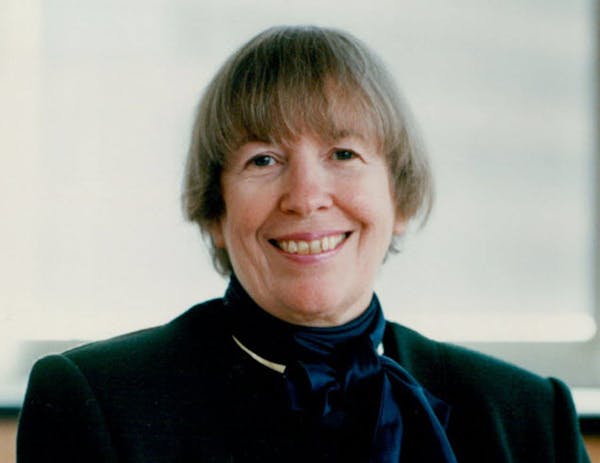Had the times had their way, Diana E. Murphy would never have become a lawyer.
A promising law school student in the 1970s, Murphy would later tell the Star Tribune that a lead attorney at the Lindquist & Vennum firm told her he didn't think juries would accept a woman trial lawyer.
Yet within two years of joining the firm, Murphy went on to begin a decades long, trailblazing tenure as a judge in Minnesota that continued until her death Wednesday at 84.
"Diana was pretty used to being the first woman to do lots of things," said Senior U.S. District Judge Ann Montgomery, who succeeded Murphy on the federal District Court bench after Murphy became the first woman appointed to the Eighth Circuit Court of Appeals in 1994. "And she was not the least bit intimidated. She was such an intellectual presence and giant that she could match wits and intellect with anyone."
Also the first female federal district judge in Minnesota, Murphy was the sole woman on the circuit's federal appellate bench until 2013. She assumed senior status in November 2016 — a form of semiretirement for judges — and continued working through April with plans to fully retire in July. She informed colleagues in a letter last month: "Time moves on."
"Her long and distinguished career opened doors to help diversify the courts and to provide inspirational leadership to generations of judges and lawyers," Chief U.S. District Judge John Tunheim said in a statement Thursday. "Her incredible civic engagement inspired many of us to try to follow in her footsteps. We will miss her intellectual force, her wise judgment, her warm and gentle encouragement, and her friendship. Judge Murphy was truly our treasured colleague."
Murphy suffered from long-term health problems, including heart disease and rheumatoid arthritis, her family said Wednesday night. While colleagues described her as battling pain almost from the outset of her judicial career, none recalled it hindering her work.
"She kept up a schedule that would exhaust healthy people who were half her age," said U.S. District Judge Patrick Schiltz.
Both Schiltz and Montgomery said Murphy's gentle speaking voice belied a "towering" presence that came to dominate the legal landscape in Minnesota.
Her landmark cases as a federal judge ranged from corporations to Indian tribal treaties, and Murphy counted justices of the U.S. Supreme Court and Minnesota Supreme Court among her friends, mentors and mentees.
Those influenced by the judge included U.S. Sen. Amy Klobuchar, with whom Murphy also shared a mutual friend in U.S. Supreme Court Justice Ruth Bader Ginsburg.
"Not only did she break the judicial glass ceiling but she continued to be a strong advocate for putting more women on the bench," Klobuchar said. "She was adored by her colleagues and by everyone that knew her from justices on the Supreme Court to her clerks right out of law school."
Montgomery called it an honor to fill her seat. If confirmed, a third woman, Hennepin County Judge Nancy Brasel, would follow in both judges' footsteps in taking the same seat Montgomery vacated in 2016.
Another Murphy mentee, Minnesota Supreme Court Justice Margaret Chutich, said the judge helped instill in her a sense that she, too, could one day join the bench.
"I think she was a teacher at heart," said Chutich, who clerked for Murphy when she was a district judge. "She just loved her law clerks."
Appellate court colleagues say Murphy's presence transcended Minnesota and even the Eighth Circuit. She was appointed chair of the U.S. Sentencing Commission in 1999 and served in that role until 2004, during a time in which federal sentencing guidelines shifted from being mandatory to advisory for judges.
"It was a sea change and she steered the judicial ship," said Judge Duane Benton, a fellow Eighth Circuit judge from Missouri.
Murphy was 16 when she graduated from St. Paul Central High School. She majored in Central European Area studies at the University of Minnesota and met her husband, Joseph Murphy, while on a Fulbright scholarship for graduate studies at the Johannes Gutenberg University in Mainz, Germany.
They married, and she stayed home to raise two sons before returning to the U in 1971 to study law, serving as editor of the school's Law Review. Her career included stints as a litigator at Lindquist and Vennum, and as a judge in Hennepin County Municipal Court and District Court.
Murphy was chair of the University of Minnesota Foundation, was a member of the University of St. Thomas board of trustees and heavily involved in numerous other civic organizations. Survivors include sons John of North Oaks and Michael of Duluth; her sister, Brenda Montomura of San Francisco, and two granddaughters. Services will be held at 2 p.m. May 22 at St. Olaf Catholic Church with a reception to follow at the Minneapolis Club.
Her peers described her as a devout Catholic who never missed mass. Whenever the two got together, Schiltz said, Murphy "was always anxious to talk about the church."
On Thursday, in remembering the judge, Klobuchar cited a memorable quote Murphy once said: "You have to fight for others and you also have to fight for your own situation."
"Judge Murphy both stood up for herself and for others, and she did it with humor, joy and awe-inspiring achievement," Klobuchar said.
Staff writer Pat Pheifer contributed to this report.
Stephen Montemayor • 612-673-1755
Twitter: @smontemayor

BCA says man pointed pistol-style BB gun at officers before he was shot in Woodbury

In Grand Rapids, Itasca Pride is planning its first event, but there is already pushback

Former diversity worker sues University of Minnesota after firing over swastika photo

